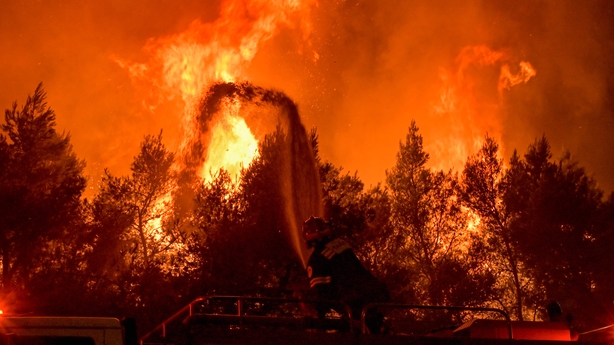Hundreds of people were evacuated by boat from an island near Athens as Greece braced for a fourth day of wildfires with emergency services forecasting strong winds and searing temperatures.
Coastguard vessels assisted by tourist boats have picked up 631 people since last night from three beaches on the island of Evia, where the flames have burned through a vast area of pine forest since Tuesday and reached the sea.
They were all moved to safety and sea patrols are continuing in case of emergency, a coastguard official said.
The skies of Athens were again clouded by thick smoke from wildfires on the northern outskirts of the city, which burst back into life yesterday after dying down earlier in the week.
A number of suburbs have been evacuated as the fire burned around the main highway linking Athens to northern Greece and hundreds of firefighters with water-bombing aircraft were trying to prevent the flames reaching the nearby town of Marathon.
Temperatures have been over 40 degrees Celsius all week and no let up was expected today with gale force winds expected to spread the flames further.

A man was killed by a falling electricity pylon in an area near Athens.
The 38-year-old, a resident of the suburb of Ippokrateios Politeia on the outskirts of the city, received a head injury when the pylon fell on him, the KAT hospital said in a statement.
At least nine people have been treated in hospital, including two volunteer firefighters treated for burns, but no deaths had been reported prior to today's incident.
French firefighters arrived in Greece last night to help and France was also due to send two water-bombing planes, as was Sweden.
Romania was to dispatch 112 firefighters and 23 vehicles and Switzerland three helicopters, a spokesman for the Greek firefighters told AFP.
Israel, too, said it is planning to dispatch an aircraft carrying 15 firefighters and a large cargo of flame retardant.
Given the extreme danger, the Greek authorities have issued a blanket ban on any visits to forests, national parks or nature spots until Monday.
"If some people still doubt if climate change is real, let them come and see the intensity of phenomena here," Prime Minister Kyriakos Mitsotakis said yesterday.
The blazes also forced the government of North Macedonia to declare a 30-day state of emergency and the defence ministry in its Balkan neighbour Albania to declare the situation "critical" because of the threat to village homes.
In Turkey, 208 fires have lit up since 28 July, and 12 were still ablaze today, according to the Turkish presidency.
Eight people have died and dozens have been hospitalised across the southern coasts of the country.
In one particularly critical event earlier this week, winds whipped up a flash fire that subsumed the grounds of an Aegean coast power plant in Turkey storing thousands of tonnes of coal.
Turkish President Recep Tayyip Erdogan's office said an initial inspection conducted after the flames had been doused showed "no serious damage to the main units in the plant".
The government is facing rising pressure after the opposition referred to a report which showed only a fraction of the budget for forest fire prevention had been spent.
Mr Erdogan has come under criticism for being slow or unwilling to accept some offers of foreign assistance after revealing that Turkey had no functioning firefighting planes.
The government has defended itself by blaming the Turkish Aeronautical Association, which Mr Erdogan said at the weekend had not been able to update its fleet and technology.
The crisis has posed an unexpected challenge to the Turkish leader two years before he faces an election that could extend his rule into a third decade.


